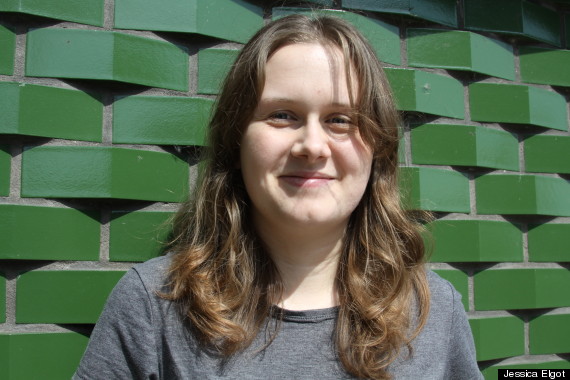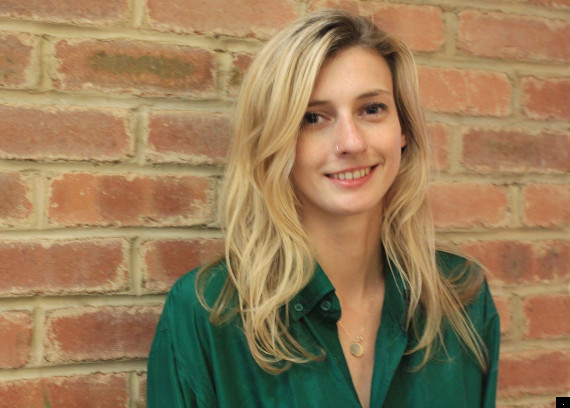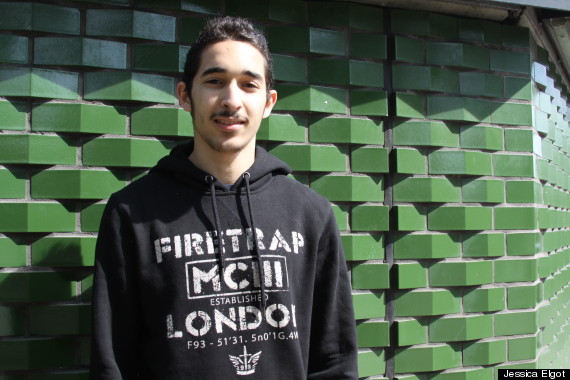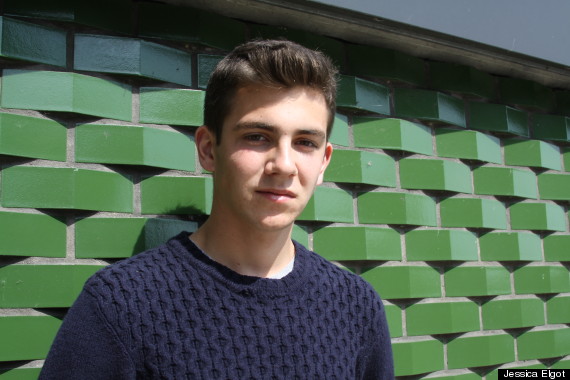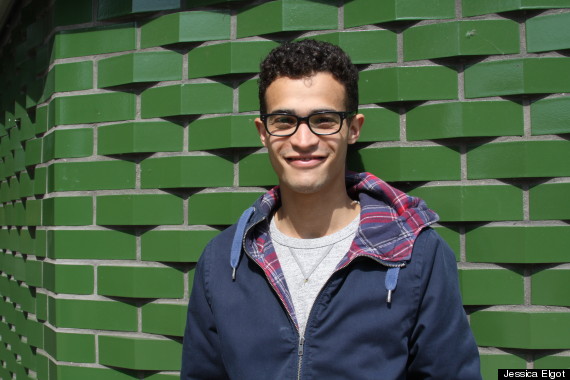
From the student sit-ins to the poll tax riots, politics was once the domain of the young and angry.
But in 2010, just 44% of 18-24 year-olds, trudged to their local school or community centre to wedge their paper into the ballot box.
That same year, a survey found 66% of young people had voted in a reality TV poll.
So if the young aren't party political, are they any less angry? That was the question we put to our new HuffPost UK Election Panel 2015, consisting of five, undecided, first-time-voters.
Their individual votes do, in fact, have the power to make a crucial difference come May 2015. All five are residents of Hampstead and Kilburn, a marginal seat with a wafer-thin Labour majority of 43.
The incumbent MP, Glenda Jackson, is retiring and all three parties are in with a chance of taking the seat. The result could be decided by a handful of ballot papers, in a constituency that reaches from the capital's most expensive streets by Hampstead Heath, to the high-rise council estates of Kilburn.
With one year to go until the general election, The Huffington Post UK is beginning a monthly debate on the issues that affect young voters. We'll be regularly checking in with the undecided members of our panel to see how the political hot topics in the news - from rows over immigration to new unemployment figures to Boris Johnson's gaffes - affect their final decision as to which party they put their X next to in 12 months time.

Megan Trace, 18, A-Level student at Queen’s Park Community School
Megan has lived in Kensal Rise all her life, the only child of a single mother. “My mum’s been involved in campaigning and activism for as long as I can remember,” she said. "One of my earliest childhood memories is of going to 10 Downing Street to hand in a petition against the closure of my nursery, a case we went on to win.”
She describes herself as “centre”, often watches Question Time and debates the show's topics with her mum. “I think the political views of your parents will always have some influence in the way that you vote, as their ideological leaning will play a role in your upbringing, but I’m free to make my own decisions,” she said.
Her key area of concern is the environment. “We’re experiencing more and more extreme weather in this country and this is only likely to become more intense and frequent in the future due to the impacts of climate change.”
Though she has yet to find a political party she identifies with, Megan “wouldn’t rule out being a politician” if she could find a party that fitted the bill. More important than a party, she said, is having a cause you passionately believe in, naming her favour political figures as former US vice-president-turned-environmentalist Al Gore and Pakistani schoolgirl campaign Malala Yousafzai.
Tess McCarthy, 23, university graduate and marketing executive
Tess has lived in Kilburn all her life, apart from three years at the University of Leiceister, and she attended school and college in north London. Though old enough to vote in the 2010 election, Tess did not register in time for polling day. This year, she wants to make her vote count.
“My family have always voted Labour however, after being impressed with their campaign I wanted to vote Liberal Democrats in the last election,” she said.
This time she could think differently, believing Clegg’s party “failed to live up to much of what they promised”.
All three major parties hold some appeal, she said, though she has always thought of herself as left-wing. Healthcare and jobs are the key issues for Tess. Becoming a campaigner or even a member of a political party is very unlikely to happen, she said.
Sajed Ammari, 17, AS-Level student at St Augustines High School
Born in north London, Sajed’s family come from France, Morocco and Dubai. His parents are decidedly unpolitical.
“They don’t get involved at all,” he said, “though they do vote in elections and sway towards the Labour party.” Despite a Labour-leaning household, Sajed said his parents’ opinions would not influence his own.
He too, has no personal political ambitions, besides voting, and cannot see himself becoming a party member. The economy is the key issue for Sajed, who intends to work in finance. Education, naturally, is an area of concern, particular examination standards as Sajed grapples with his own studies.
“There hasn’t been one person that has been laid back and is finding A levels easy,” he said, accusing Education Secretary Michael Gove of being out-of-touch with the severity of exams. “He has no interest in what young people think.”
His political inspiration is London Mayor Boris Johnson, because of his charisma, humour and the introduction of Boris bikes. But he is also cautiously optimistic about Labour leader Ed Miliband, who he believes has wrongly been portrayed as weak in the press. “He may not be seen as a visually strong leader, but he is a strong leader politically,” Sajed said.
Liam Michaels, 17, AS-Level pupil at King Alfred School
Though his parents are separated, Liam says politics is a huge feature of his life with both parents with “with discussions often erupting during meal times”.
“My father is a journalist focusing on the war in Afghanistan and Middle-Eastern politics and works with elections that take place over Africa,” he said, citing him as his key political influence.
Both parents are left-wing and their discussions certainly do inform Liam’s politics, he said, but they would never tell him which party to vote for. He identifies as left-wing.
Liam named “the welfare state, the environment, our involvement in the Middle East and the eroding of civil liberties” as the key issues the concern him. These are both national and local issues, he said, noting a lack of affordable housing in his local area, Belsize Park.
He would consider becoming a member and even campaigning for a political party in future, if he found the right fit, but doesn’t believe he has the personality to want to be a full-fledged politician.
Sasha Isaacs, 17, AS-Level student at St Edward's, but about to start childcare apprenticeship
Having attended local independent schools and now a boarding school in Oxford, Sasha is planning to leave school in a month’s time to begin a childcare apprenticeship in the constituency. “I have never enjoyed school very much and am very interested in pursuing something I enjoy,” he said.
At home, politics is part of family life, with his parents encouraging discussion. “Neither have though ever identified directly who they vote for but I can get a general sense,” he said. He identifies as “right-wing” though feels there is a problem with elitism in politics.
The conduct of politicians is something with will be a key decider for Sasha. “The expenses scandal is the most important issue to me as I find it repulsive that politicians take money like that, from tax-payers.”
“I could see myself campaigning for a party,” he added, "but I cannot see myself ever becoming a politician, I am not argumentative enough and that I am too concerned with pleasing everyone.”
So what is at the heart of this dual sense of apathy and injustice that most young people feel when presented with a ballot box?
We asked the panel why they feel they aren't involved in politics yet, the disconnect they feel when politicians discuss "the youth" and what is it about the major parties which means they aren't ready to commit.

What is it that gets young people interested in voting?
HOW DO WE MAKE YOUNG PEOPLE CARE ABOUT POLITICS?
Lowering the voting age to 16, would be a start, said Megan, “but young people certainly shouldn’t use this as an excuse”. “Many policies, such as the scrapping of EMA, rising tuition fees and educational reforms all impact young people, but we don’t feel like we have any say,” she said.
Age restrictions mattered, but ignorance was another obstacle, Sajed said. Both Tess and Liam said they were also frustrated at how little politics was taught in school.
“A basic political understanding is not prioritised, creating a misinformed and disinterested voting generation,” Tess said.
“I firmly believe schools should teach some sort of political studies from the start of secondary education,” Liam added.
A sore lack of diversity in politics was off-putting to many young voters, Liam said. Sasha agreed, and added he believed “the majority of politicians are academically elite, with their degrees from Oxbridge,” meaning many young people have “no relatable role model” in the House of Commons.
WHY DO PEOPLE BECOME POLITICIANS?
Most of the panel were sympathetic to politicians at the start of their careers, but believed many were seduced by power and prestige. Even unintentionally, Tess said most “fall into the common trap of promising things they cannot deliver in order to get into power”.
There are a remarkable few who do resist this, who genuinely wish to do good, Liam said, but others had “a lust for power”. Many have difficulty relating to their constituents, Sajed said, and cannot overcome “expenses scandals and other shenanigans which make people uninterested in politics”.
All believed politics had become too closely linked to showmanship. “It seems that since Blair, the kind of people to become politicians are all charming, articulate and extremely self-confident,” Sasha said.

What do young people really think of politicians?
WHAT DO YOU THINK OF THE TORIES?
Most of the panel did not see the Conservatives as a party in touch with their values, with Tess calling the party “the definition of vested interest”. And the party were intent on “dismantling the welfare state” in the eyes of Liam.
Megan described the current government as “an odd mixture” and said there were few Conservative policies she could identify with. The sale of Royal Mail, and the expenses scandal surrounding former Culture Secretary Maria Miller had tainted the party in the eyes of the public, Sajed said, though they were “good at balancing the budget”.
David Cameron is far more popular than his party with the young undecideds, with Megan saying she believed he was “the strongest leader out of the four’, a view echoed by Sajed. All agreed that Cameron was charismatic, but Liam said he did not trust the Prime Minister when he spoke.
Cameron “had the potential to be a great Prime Minister”, Sasha said, but had been scuppered by being forced to govern in coalition with the Lib Dems.
WHAT DO YOU THINK OF LABOUR?
There is a disconnect with Labour too, with most of the panel saying they were unsure they could be trusted in government. They are “fractured and often too idealistic”, Tess said.
But Sajed was more positive, saying he believed they cared deeply for people’s welfare, but “have problems with spending too much”. The party is Liam’s current choice because of the emphasis on the welfare state.
Megan is more uncertain, and said she likes “some of their policies” but did not feel confident in the strength of Labour leader Ed Miliband, whom Sajed said “needs to work on his media image”.
Sasha agreed that Labour “should be doing better in the political climate” and capitalising on coalition gaffes.
WHAT DO YOU THINK OF THE LIB DEMS?
The party that drew the most profound sense of disillusionment was the Lib Dems, though Sasha said he believed they had performed well in government, under the circumstances.
“I persuaded my mum to vote for them for the 2010 election, but I doubt I’d repeat this when I’m given the opportunity to vote,” Megan said.
“They betrayed a significant part of society in the last election,” Liam added, though he said leader Nick Clegg was a “likeable” character.
But Clegg, Sajed said, had done poorly in debates with Ukip’s Nigel Farage and appeared “attention-seeking”.
WHAT DO YOU THINK OF UKIP?
None of the panel had any time for Ukip or the BNP. Farage’s image is no more than “clever PR,” Megan said, comparing his image to London Mayor Boris Johnson.
He is the kind of man to “give politics a bad name”, said Liam, a view echoed by several others. Tess said the party was “extremist”. Farage was “persuasive” as a speaker, Sasha said, but the party was made up of “a bunch of closet racists”.
All said they thought the British National Party to be “racist” and political nonentities.
So the BNP is, unsurprisingly, out - but who's in? Who do they want to vote for, in the closest general election race in living memory? Our panel members have 12 months to make up their minds.

